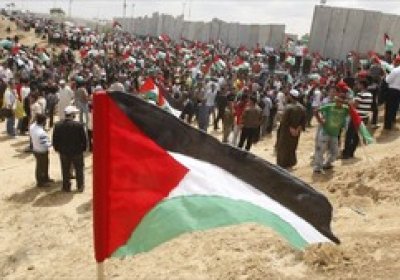Marcel Khalife, born in 1950 in Amchit, Lebanon, has injected new life into the music produced by the oud (the Arabic lute) ― helping revive an important part of Arabic culture. Khalife studied the oud at the Beirut National Conservatory of Music and graduated in 1971. From 1972 to 1975, Khalife taught at the Beirut National Conservatory of Music, public universities and local private music institutions. During that period, he toured the Middle East, North Africa, Europe and the United States giving solo performances on the oud.
Lebanon
This article is reposted from http://gazatvnews.com . Protesters fired on by Israeli forces were commemorating al Nakba ("the catastrophe"), as Palestinians refer to the ethnic cleansing that accompanied the founding of Israel.
Wikileaks founder Julian Assange said that over the next six months, Wikileaks will be releasing more files related to Israel. “There are 3,700 files related to Israel and the source of 2,700 files is Israel,” he told Al-Jazeera on December 22. “The Guardian, El Pais and Le Monde have published only two percent of the files related to Israel due to the sensitive relations between Germany, France and Israel.”
The Israeli government agreed “in principle” on November 17 to withdraw from the northern part of Ghajar, a village in the occupied Golan Heights. The village was conquered by Israel in 1967, during the six-day war.
In 2000, Ghajar was split in two. The northern part was to be controlled by Lebanon, the southern part by Israel. The southern part of Ghajar was deemed by the United Nations (UN) to be a part of the Golan Heights, Syrian territory occupied by Israel since 1967.
Below is abridged from a May 12 post to . Nadia Hasan is a Chilean-born Palestinian activist, who maintains the blog http://palestinaresiste2.blogspot.com.
On February 12 Imad Fayez Mughniyeh, a leader of Hezbollah which led the successful resistance to Israels July-August 2006 war on Lebanon was assassinated in Syria.
Sporadic fighting was reported to have erupted on May 29 on the edges of the Nahr al Bared Palestinian refugee camp in northern Lebanon between the Lebanese Army and a Sunni Arab Islamist group called Fatah al Islam. On May 21, the Lebanese Army had laid siege to the camp and its 45,000 residents after the pro-US government of Prime Minister Fouad Siniora alleged that members of the little known Islamist group had carried out a bank robbery the previous day.
On January 22, the Lebanese parliamentary opposition, led by the Shiite-based Hezbollah movement, organised a general strike to demand the resignation of the US-backed government of PM Fuad Siniora.
On December 1, up to 2 million people attended a rally in Beirut called by Hezbollah and its allies to demand the resignation of US-backed Lebanese Prime Minister Fuad Sinioras government.
The November 21 assassination of industry minister Pierre Gemayel has provided a focus for US-backed Lebanese politicians to rally their supporters for a possible confrontation with the Hezbollah-led opposition bloc.
Gemayel served as the representative of the Christian-based far-right Phalangist party in Prime Minister Fuad Sinioras government.
The US-backed government of Lebanons Sunni Muslim prime minister, Fuad Siniora, has been thrown into crisis after five Shiite cabinet ministers resigned over the November 10-11 weekend after Siniora refused to change the makeup of his government to give more cabinet posts to Hezbollah and its allies.
Israeli cabinet minister Jacob Edery admitted on October 22 that Israel had used white phosphorus, a substance that burns when it comes into contact with air, during its 34-day July-August war on Lebanon.
- Previous page
- Page 2
- Next page


